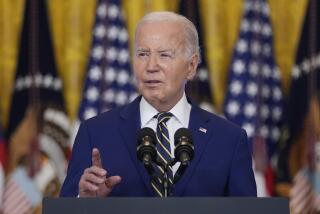Argentina Votes Rights Crimes Amnesty
- Share via
BUENOS AIRES — A bill giving most military officers amnesty for 1970s human rights crimes received final congressional approval Friday after a legislative leader warned that the nation faced a possible military coup if the measure was not passed.
The amnesty, previously passed by the Senate and certain to be signed by President Raul Alfonsin, was approved by the Chamber of Deputies by a 125-54 vote.
The bill exempts from prosecution those soldiers who held the rank of lieutenant colonel or lower, as well as all officers, regardless of rank, who were not directly involved in this country’s so-called “dirty war” against Marxist guerrillas and their suspected leftist supporters during military rule in the 1970s and early 1980s.
A Defense Ministry spokesman said that the bill still leaves 40 to 50 military officers liable to trial for human rights offenses.
9,000 ‘Disappeared’
Five former military junta members and five other military and police officials now are serving prison sentences, ranging from four years to life, for responsibility for the torture and slaying of an estimated 9,000 people, who were officially listed as “disappeared.”
Two of those already convicted, a police doctor and a corporal, received amnesty under the bill approved Friday.
Opponents of amnesty, including all human rights groups here, called the law a “mockery of justice” and questioned its constitutionality.
Military leaders had no immediate comment on the Chamber’s approval of the bill. They had complained bitterly that soldiers were being prosecuted for winning what they call the “war against subversion” in the middle and late 1970s.
Peronist Opposition
The main backing for the measure came from Alfonsin’s governing party, the Radical Civic Union. The Peronist party, Alfonsin’s main opposition in Congress, and parties of the left believed it was much too generous, while conservative parties wanted total amnesty granted.
The Chamber’s majority leader, Cesar Jeroslavsky, warned his colleagues the bill was necessary to preserve Argentina’s precarious 3 1/2-year-old democracy and prevent a coup by disgruntled officers who demanded an amnesty.
“I do not want to see any more painted faces in this country,” Jeroslavsky said, referring to renegade officers who smeared their faces with camouflage paint during a rebellion in April. “What we have to do is face the facts--we’re talking about a coup.”
Jeroslavsky’s speech was a blunt reminder that the legislation was inspired by the rebellion of junior and middle-grade officers during the Easter holidays.
Civilians Defied
Although no shots were fired, the rebel officers demonstrated their defiance of civilian authorities by backing an officer who refused to answer a summons to appear in a civilian court to answer charges of human rights crimes.
The rebels surrendered after five tense days, but the uprising highlighted Alfonsin’s difficulty in maintaining discipline.
More to Read
Sign up for Essential California
The most important California stories and recommendations in your inbox every morning.
You may occasionally receive promotional content from the Los Angeles Times.













